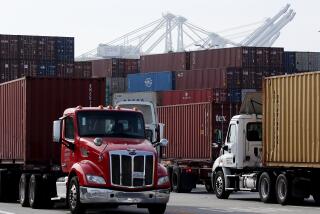Tighter Fuel Rules Set for Bulky SUVs
- Share via
BALTIMORE — The government set tighter gas mileage rules Wednesday for pickups and sport utility vehicles, including bulky SUVs such as the Hummer H2 and Chevrolet Suburban, responding to rising concern about the supply and cost of energy from abroad.
The new fuel economy rules, affecting model years 2008 through 2011, would save 10.7-billion gallons of gasoline over the lifetime of the vehicles sold during the period and go further than a Bush administration proposal last summer, officials said.
“The new standards represent the most ambitious fuel economy goals for light trucks ever developed in the program’s 27-year history,” Transportation Secretary Norman Y. Mineta said.
The rules were outlined amid growing public concern about U.S. dependence on foreign sources of oil and rising pump prices. It represents the most significant changes to the corporate average fuel economy standards in three decades and will affect automakers’ product lineup.
Mineta’s announcement follows President Bush’s declaration in January that the U.S. is “addicted to oil.” Bush has called for a 75% reduction in Middle East oil imports by 2025.
The new rules do not apply to passenger cars, which must meet a 27.5 mile per gallon average.
Under the standards, automakers now must meet an average of 21.6 mpg for their 2006 model year light trucks. That average will rise to 22.2 mpg for 2007 vehicles. Under the new rules, the fleetwide average would reach 24 mpg by 2011, when the largest SUVs will be included in the calculation.
Transportation officials estimated that the plan would add about $200 to the cost of each vehicle, but consumers probably would recoup that cost in fuel savings in four years, they said.
The rule would include SUVs weighing 8,500 to 10,000 pounds for the first time starting in 2011, but would not include large pickup trucks in the weight class. Transportation officials said they would require manufacturers to install fuel saving technology on all passenger trucks.
Environmental groups have pressed for the higher standards and urged that the rules start applying to large trucks and sport utility vehicles. Environmentalists also had pressed for higher fuel savings. One group estimated that the new rules would save only two weeks of fuel a year over the next two decades.
“After the Bush administration acknowledged our oil addiction, one might have expected a slam dunk, but this is an air ball,” said David Friedman of the Union of Concerned Scientists.
The new rules would call for specific fuel economy standards for all light trucks based on a vehicle’s dimensions. Mineta said it would help close loopholes used in the past by automakers to meet fuel economy standards and level the playing field.
U.S. automakers have said the current system hurts them because sales of large SUVs must be offset by light trucks to comply with fuel economy rules.
Automakers have noted that the final plan will probably mean seven straight years of higher fuel economy requirements for light trucks. The industry has fought previous attempts to raise the standards but has expressed support for the proposal’s direction.
Charlie Territo, a spokesman for the Alliance of Automobile Manufacturers, said the new rule “challenges automakers to increase the fuel efficiency of all vehicles, regardless of size.”






